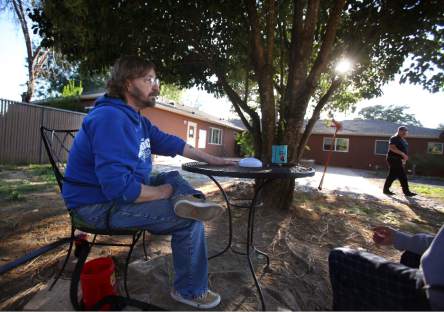Been Down So Long
Chapter One - Page 3
He'd been homeless for seven months in the Santa Rosa area, living with friends, before he came to Hearn House in March. "Kept me from drinking myself to death," said Crawford, who receives $1,171 a month in Social Security benefits. Hearn House residents participate in counseling sessions three times a day. "I had to talk about my stuff," Crawford said, after years of not discussing his issues with anyone.
Therapy helped him "remove a lot of shame and guilt," and Crawford, now sober, said he will continue seeing a VA psychiatrist and working on his drug and alcohol issues after leaving the house. "We just need people to give us a shot, to trust us," he said, referring to landlords. "I don't want to become homeless again. I want to cherish my apartment and stay in it."
In the January survey, 400 veterans comprised 11 percent of the county's homeless adults, and 86 percent of them were unsheltered, living on the street, in vehicles or encampments. "Veterans are overrepresented among the homeless population," said a 2009 report to Congress. Slightly less than 8 percent of the total population has veteran status, it said.
The reasons are not all related to military service, but "combat exposure, wartime trauma and post-traumatic stress disorder can lead to further social isolation and psychiatric hospitalization, which are primary risk factors for homelessness," according to a report on Vietnam War-era veterans in the American Journal of Psychiatry. About 40 percent of the county's homeless veterans were age 51 to 60, by far the largest age group, in both the 2011 and 2013 surveys.
 Veterans housing advocates noticed an emerging trend as the percentage of homeless veterans age 18 to 30 more than doubled from 7 percent in 2011 to 15 percent in 2013. Veterans from the Iraq and Afghanistan wars now are moving into the homeless services pipeline, Valadez said.
Veterans housing advocates noticed an emerging trend as the percentage of homeless veterans age 18 to 30 more than doubled from 7 percent in 2011 to 15 percent in 2013. Veterans from the Iraq and Afghanistan wars now are moving into the homeless services pipeline, Valadez said.
It often takes several years of "crashing," relying on friends and relatives for shelter, before a veteran winds up living in a car, Abramson said. Charlie Wall, who said he lived in motels, hotels and on the streets for four years before coming to Hearn House, said there is nothing romantic about that life. "You're extremely lonely," he said. "It feels like no one gives a crap."
When he was paying $750 a month for housing with no voucher, plus $200 for prescription drugs for post-traumatic stress symptoms, Wall had about $200 left from his military pension for "food and cigarettes," he said. Wall doesn't think the public is obliged to help veterans. "We went in to serve this country," he said. "We knew what we were doing." But, he allowed: "If you want to be kind to us now, that would be wonderful."
(And are there any out there extending a hand of kindness? Tune in tomorrow to this three part serial to see what, if anything, people are doing.)





